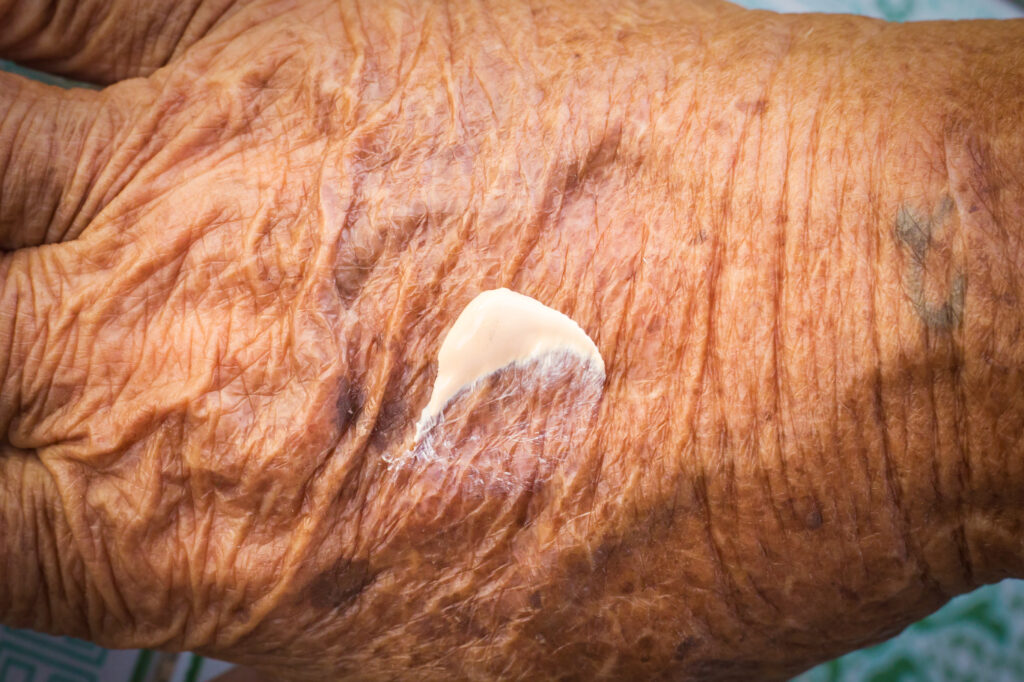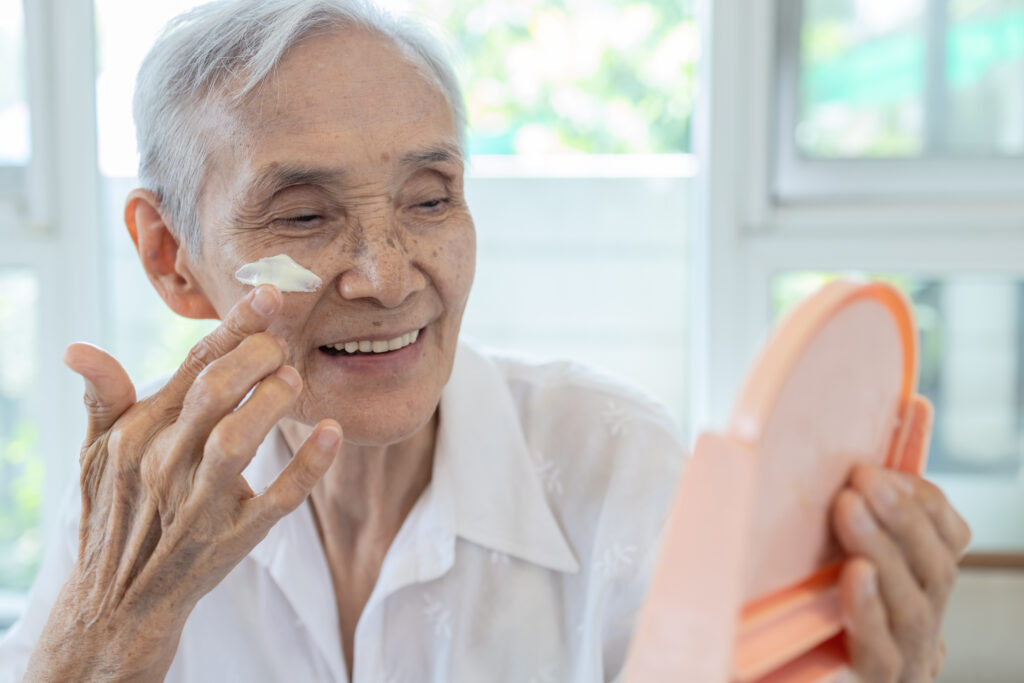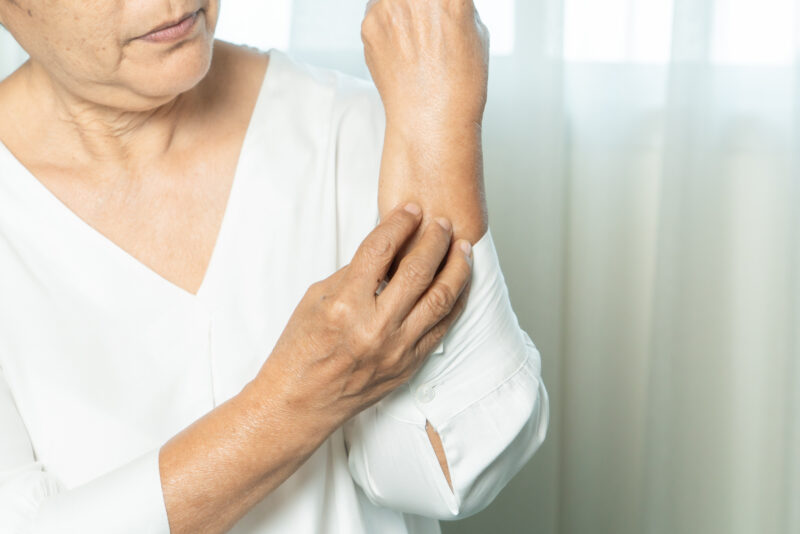Many say they can feel winter in the air, or they feel changes in their joints with the cooler weather.
Yet, for many seniors, they feel winter in their skin—that unmistakable, tight burning feeling that indicates winter dry skin has arrived.
Winter dry skin is especially problematic with older adults, with about 85% of older people developing winter dry skin, often called the “winter itch.”
The primary culprit? Chemistry.
It’s a rather simple lesson in osmosis, which says water moves from areas of high concentration (inside your skin) to areas of low concentration (the air). Heaters add insult to injury, increasing this potential and thus accelerating the mass exodus of moisture from your skin as it flees toward the overheated indoor air. With some heating systems, you may as well crawl into a giant fruit dehydrator, the effects are so pronounced.

What older adults can do to alleviate dry skin in winter
Yes, dry skin is annoying and uncomfortable, but it can also lead to bigger issues. It’s important to help the older adult in your life maintain healthy skin all year. Here are a few helpful ways to do that.
Find an oil-based moisturizer: The wrong type of moisturizer can have a drying effect. Think back to the osmosis explanation; water wants to leave your skin to find areas of lower water concentration—the air. Oil-based creams create a barrier that prevents this movement from happening, trapping the moisture inside your lipid skin barrier. Water-based creams actually have the opposite effect. So, although water-based lotions are easier to apply, oil-based creams are the way to go if you want to cure “winter itch.”
Moisturizers with borage oil – made from the borage plant – claim to penetrate deep, delivering hydrating benefits directly to the cells, which helps skin retain more moisture and stay healthier. Borage oil can also be used as a facial moisturizer. (This natural skincare facial oil from jojoba, olive and grape seed oils is another option.)
Other great choices for oil-based moisturizers are:
- Neutrogena lightweight body oil
- Renpure Plant-Based Body Lotion for Dry Skin
- Moroccan Dry Body Oil or Moroccan Oil Body Butter
Look for a non-drying foundation: Plant-derived antioxidants and moisturizing foundations, as well as tinted moisturizers, are all excellent ingredients to look for in a foundation.
- Bobby Brown Intensive Skin Therapy Foundation
- Bareminerals Complexion Rescue Hydrating Foundation Stick
- Neutrogena Healthy Skin Anti-Aging Perfector Tinted Facial Moisturizer and Retinol Treatment with Broad Spectrum SPF 20 Sunscreen with Titanium Dioxide,
- DRMTLGY Anti-Aging Tinted Moisturizer
Invest in daily supplements: To have healthy skin, you have to have a healthy body. Supplements are a great way to ensure your skin has the internal tools to remain moist and supple in winter. Here are several suggested options:
- Vitamin D: Research shows that low levels of vitamin D may increase the chances of dry skin. Therefore, supplementing with this nutrient may help improve skin hydration. Shop VitaminD online.
- Collagen: Extensive amounts of research support the use of collagen supplements for increasing skin hydration and treating dry skin. Shop for collagen supplements online.
- Fish oil: Fish oil may help improve skin hydration and decrease moisture loss. It has also been shown to improve dry, scaling skin in those with psoriasis. Shop for fish oil online.
Avoid beeswax lip balms: Lips respond better to an ingredient called paraffin ceramides, which are naturally found in the body and last longer in a moist environment (i.e., lips) than beeswax. Here are some alternative recommendations:

Other helpful tips and tricks:
Simple lifestyle changes can be done in addition to applying creams, oils and lotions to the skin.
- Moisturize from the inside out: Drink plenty of water throughout the day.
- Add moisture to the air. Add a humidifier to your home or work space.
- Replace your shaving cream with hair conditioner. Yes, that’s right. Shaving cream is drying. Hair conditioner offers the same smoothing benefit while also adding moisture to your skin.
- Avoid irritating scrubbing brushes. Avoid vigorously scrubbing your limbs and trunks while washing. And pat, don’t rub, yourself dry after showers and baths.
- Cover your skin, especially the legs and feet. Coverage prevents moisture from escaping into the air at your feet and your legs.
When to see a doctor about winter dry skin
Doctors recommend making an appointment If your loved one’s skin is continually dry and itchy, as this may be a symptom of a disease or a medication side effect. It can also affect an older adult’s sleep, which can worsen health conditions and cause irritability. Also, make an appointment for them to see a doctor if their dry skin is accompanied by redness, if they have open sores or infections from scratching, or if they have large areas of scaling or peeling skin.

